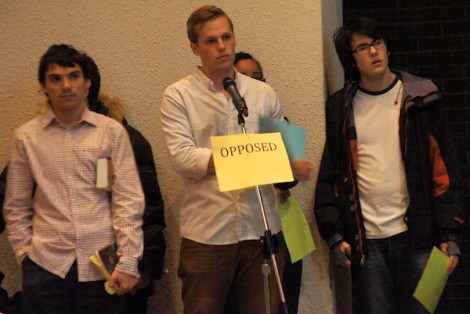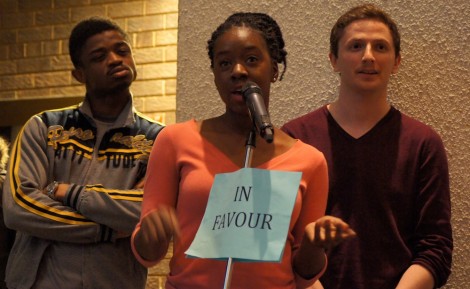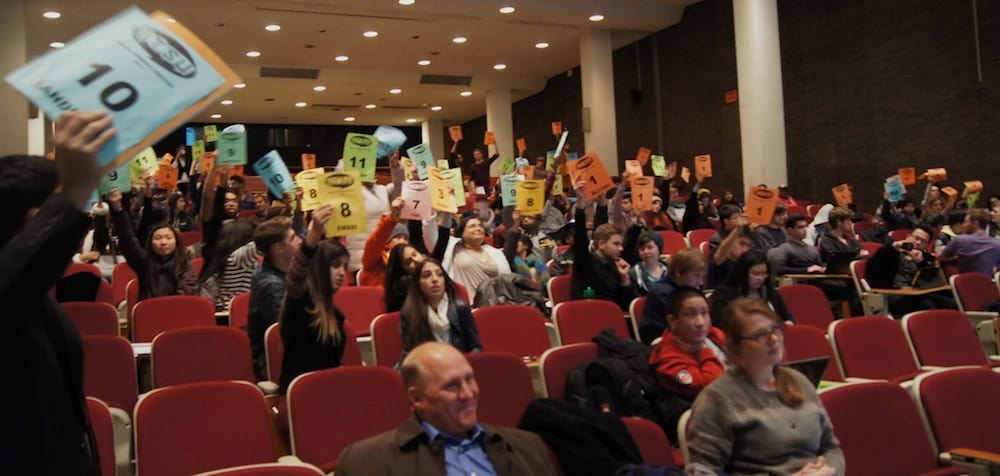Every motion except one passed at the University of Toronto Students’ Union (UTSU) Annual General Meeting (AGM). While UTSU president Munib Sajjad called for student engagement and campus unity, some members of the union left disaffected when their grievances were not heard.
Engineering society (EngSoc) director Pierre Harfouche motioned to remove items 2 to 10 from the agenda, after the Board of Directors ruled his motions out of order prior to the AGM. This sparked a procedural debate over the necessity of a motion to approve the agenda. “Robert’s Rules state that if an agenda is not approved, members can amend it by a majority,” argued Harfouche, referencing the rules of order to which UTSU AGM’s adhere.
Ashkon Hashemi, the chair, defined the order of proceedings for the meeting as an order of business rather than an agenda — meaning that the motion needed a 2/3 majority motion to pass, rather than a simple majority. “What we have before us is an order of business, as specified by UTSU’s bylaws. If you want to change things, you can, but it’s a 2/3 majority motion,” stated Hashemi. The motion did not pass. The order of proceedings distributed was titled “agenda,” was referred to as an agenda in documents leading up to the meeting, and an approval of the agenda vote has been at the UTSU AGM for at least the last three years.
“What it appeared to be was filibustering,” claimed Sajjad, describing Harfouche’s tactics. “It wasn’t fair to any of the students commuting to campus, or coming from Mississauga, or any other place.”

MASHAL KHAN/THE VARSITY
Harfouche has already submitted a motion for next year’s AGM that would allow a referendum to be held by the Faculty of Engineering to reduce its UTSU membership fee to $0.00.
During question period, student Ryan Gomes asked how a $152,000 surplus became a deficit of $50,000 between the UTSU’s 2012 and 2013 audits. Gordon Lee, representative of Yale and Partners LLP, which conducted the audit, said that organizations like the UTSU should be focused on trying to get to “zero,” rather than turning a profit. “A $52,000 deficit on $13 million in revenue is very close to zero in my books,” said Lee.
Despite students queuing up to discuss the audit, the first speaker called the question, putting it to an immediate vote. There was no discussion of the issue, and 480 members voted in favour of approving the financial statements to 205 opposed.
Sajjad said he voted on the motion to call the question in order to keep the debate moving after earlier delays. “I was worried about people leaving. I wanted to get to the motions that affected the students’ union,” he said.
Many members were dissatisfied with the rapid move to voting, and left the auditorium. Former St. George Round Table chair Scott Dallen was among those leaving the AGM. “They voted to stifle the debate on that issue; it just moved directly to a question. There’s no point in it,” he said.
Nishi Kumar, president of the University College Literary and Athletic Society (UCLit), said that while the debate over procedure was unfortunate, it could improve the AGM in the future. “I hope that having seen this type of procedural understandings, students are better able to work within the system that is presented to them, and that next year’s meeting can be more efficient,” she said.

MASHAL KHAN/THE VARSITY
The motion to reprimand Students Against Israeli Apartheid (SAIA) was the only item on the AGM’s agenda to be defeated. Michael Wainberg, who proposed the motion, alleged that the group was discriminatory. Wainberg pointed out that SAIA’s speaking policies prioritize equity-seeking groups, but do not allow speakers to self-identify as such — requiring organizers to decide, for example, whether individuals appear queer or trans. A student opposing the motion said: “SAIA stands in solidity with all oppressed groups, and opposes all forms of discrimination.”
In his opening remarks, Sajjad expressed a desire to engage students, unite them over the goal of affordable education, and avoid alienating the UTSU’s membership. “Tonight, you will have the opportunity to shape the future direction of the UTSU and ask us any questions you may have,” he said.
Aidan Fishman, a student member of U of T’s Governing Council, tested that statement by raising the issue of fee diversion and defederation during the question-and-answer period following Sajjad’s speech. Fishman asked whether there was any circumstance under which the UTSU would amend its bylaws to permit defederation. “Cutting up the students’ union isn’t the way to go,” Sajjad said in response, pointing out that student societies can hold referenda to increase their membership fees if they would like to expand services.
Sajjad’s absence at the Student Societies Summit was also addressed. Mary Stefanidis, president of the Innis College Student Society (ICSS), asked why the UTSU had not sent its president to the summit, and claimed that the UTSU was the only organization not to do so. The ICSS had voiced its concerns in a letter to the summit on November 15, criticizing the current UTSU representatives.
Sajjad said that he was offended by the letter, that his vice-presidents can speak on the Summit’s issues just as well as anyone else at the UTSU, and that Stefanidis’s claims were false. “I don’t look at myself as president and therefore the boss of the UTSU. I am simply the chief spokesperson,” said Sajjad. “I trust my executives that are supposed to be there.”
The motions that were passed included the motion to amend the bylaws to comply with the Canada Not-For-Profit Corporations Act, which will no longer allow voting by proxy at board meetings; a motion to create an online forum for members to report issues and concerns to the UTSU; a motion to investigate the board and commission structure; and a motion endorsing the “Raise the Minimum Wage” campaign.
While a number of colleges’ student representatives attended the AGM, Trinity College chose to abstain. Benjamin Crase, Co-head of College at Trinity, said that his group did not believe that the AGM fostered democratic debate, and encouraged to attend Trinity’s Christmas Dinner, which usually takes place on the last Wednesday of November. “As student leaders, we were not prepared to deceive our membership by telling them their voices would be heard at the AGM,” said Crase.
“I think everyone has a voice at the general meeting,” said Sajjad, highlighting online voting as a reform implemented because of opinions voiced at an AGM.


